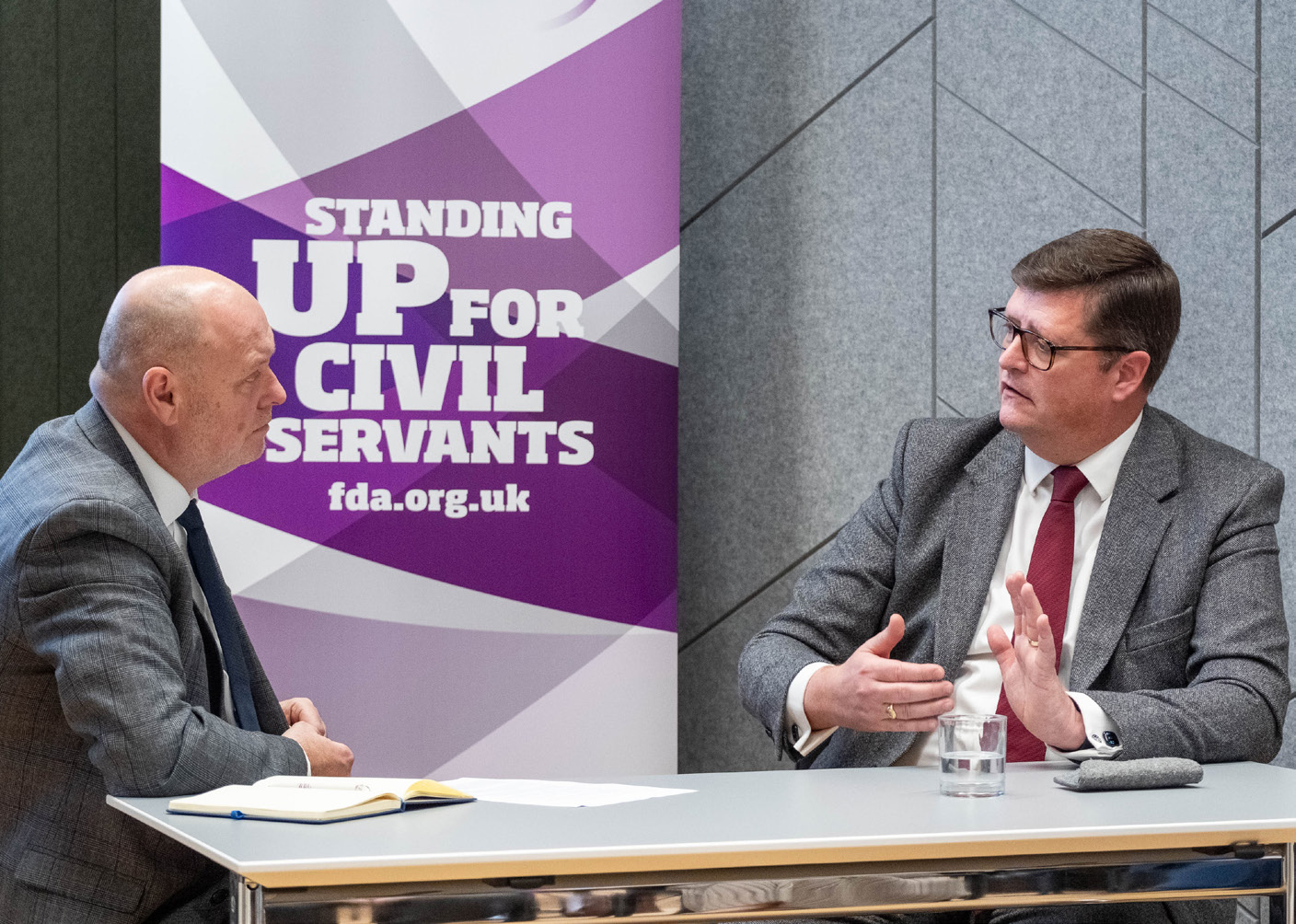Union advocate: The FDA talks to Mike Jones QC

Despite initially seeing it as a “flight of fancy”, Mike Jones achieved a position as a rare Queen’s Counsel (QC) within the Crown Prosecution Service. He talks to Laura Gilbert about prosecution, “taking Silk” and being a member of the FDA.
“As a child I went from wanting to be a fighter pilot to a farmer. There are some people who I know who wanted to be a lawyer since they were three years old, and that’s great in some respects – it shows commitment if nothing else – but I have to say I looked at all sorts of different careers.”
Despite this lack of infant certainty, Mike Jones has certainly found his niche. A 2018 finalist for the Bar Council’s Employed Barrister of the Year, the prosecutor is the third ever Crown Prosecution Service (CPS) lawyer to “take Silk”, and the first to do so in Wales.
“I come from a comprehensive school in the Welsh Valleys,” Jones explains, “so I’ve come at it not from perhaps, what some expect, as a traditional way. Apart from a cousin in Sheffield, there are no other lawyers in the family.” His mother was a housewife, who sang in the BBC Choir in Wales and his father was a chartered engineer “for the better part of 45 years, although in his spare time he used to write for the Two Ronnies and for Dave Allen”.
Jones became neither a singer nor a script writer, but initially studied Economics at university. However, in his second year, he decided he was “not going to be a great economist”. Fortunately, he had the opportunity to complete a short placement in a Chambers in Cardiff — “mini-pupillage”. “The work experience I did that week was pretty much focused on crime, and as a consequence I was seeing jury trials.”
It was the advocacy which drew him to this career — specifically, the “way you engage with twelve members of the public, twelve jurors, to put across your particular case”. He finished his degree, then embarked on a course of training to become a lawyer. After a pupillage in Swansea (and a tenancy alongside future First Minister for Wales, Carwyn Jones), he returned to the Welsh capital to defend and prosecute cases in the Crown Court as a member of 30, Park Place Chambers.
In 2009, the CPS started developing its Crown Advocacy Programme, under then Director of Public Prosecutions — now Shadow Brexit Secretary — Keir Starmer QC MP. The department was seeking to employ the first ever Senior Crown Advocate in Wales. Jones, already a Grade 4 prosecutor by now, got the job.
Jones, who joined the FDA the same year he became part of the CPS, credits his union with supporting the advocacy programme. “The FDA has been at the forefront of developing the Crown Advocacy Programme,” he explains. In-house advocacy contributes to a more “holistic approach to prosecuting”, which means all CPS lawyers — advocates, charging and reviewing lawyers — “have the opportunity to be kept directly informed on cases and take immediate action if requires”.
“When some saw in-house advocacy as a passing phase, the FDA was quick to see the advantages and ensure it was invested in and developed. Now, there’s an advocacy 2020 strategy, which hopefully will bring greater encouragement, support and structure to all levels of Crown Advocates in the Crown Prosecution Service.”
Initially, Jones worked on a range of Crown Court cases, including rape and other sexual offences, fraud and homicide. “I was undertaking a similar kind of work as I was in Chambers,” he recalls, “but I was now doing it continually. Your learning curve becomes a lot steeper and sharper.” Colleagues then started asking Jones if he would consider applying to become a QC.
“It was something I had fleetingly thought about before, but dismissed. You think ‘I’m busy concentrating on the work I’m doing without engaging in flights of fancy”, Jones admits. “However, I was fortunate enough to have members of the judiciary and senior practitioners who encouraged me, so I applied in 2016.” After an intensive process, and a ceremony which involved wearing “a full-bottomed wig, pair of tights and buckle shoes”, Jones was appointed as “One of Her Majesty’s Counsel, Learned in the Law”. “Since then, most — if not all — of the cases I’m leading on are of homicide, murder, manslaughter and attempted murder.”
Jones hopes to see more employed practitioners “take Silk”, and backs the FDA’s campaigning for better access to judicial appointments. “There needs to be a greater awareness among employed advocates, barristers and solicitors that there are these opportunities,” he says. “There are a number of people in CPS I know with part-time judicial appointments, and they can enrich an organisation. If you have an employee who, as part of their life, acts in a judicial capacity in a tribunal, for example, they can bring that learning and experience with them into the organisation.”
Jones believes employers should encourage their employees to look for these positions, and support their lawyers in applying for them. “Helping an employee to achieve their potential”, he argues, “not only fulfils the individual, but benefits the organisation as a whole.”
When asked about his transition from the private to public sector, Jones notes the move “dispelled the myth by some outside the CPS, that civil servants work ‘nine to five’. I can vouch for the fact that the people I know in the CPS in Wales work well in excess of that.”
The advent of social media has brought with it unprecedented pressures due to the “volume of material that now comes through the police and prosecution services”, all of which needs to be thoroughly examined. In addition to this, the work can take an emotional toll on some. “We’re in a job that, by its very nature, is dealing with human tragedy,” Jones states.
“Each trial has a potentially life-changing effect on a person and their family — whether a complainant, victim or defendant,” so there is a need to ensure everything is done properly, efficiently, and to the best of the lawyer’s abilities. Beyond that, there are the constant time restraints of court orders. An unexpected development in a case which needs to be immediately addressed, or covering for a sick colleague, can lead to drastic spike in workload and hours. “When you’re self-employed, certainly at the Bar, you are frequently working antisocial hours. But there’s no difference, in my experience, as an advocate in the Crown Prosecution Service.”
Jones is also proud to be a member of the FDA, and feels more protected in his workplace because of it. “I was made aware of the advantages of FDA membership, and the work that the FDA did right through the civil service, and the respect the FDA carried with it,” he notes. “I’m sure anyone in any organisation can at times feel isolated or anxious, and it’s reassuring to know that there’s an organisation like the FDA that is there for the interests of its members, in both a fair and determined way.”
Jones argues that there is a practical and ideological advantage for individuals to become part of the union movement. “If you are a member of the FDA, you are saying ‘I want to work in an organisation that is committed to openness, fairness and opportunity.’ And it’s a reminder to all employers — whoever they are, large or small — that those values are paramount to a healthy organisation. If they know that you are a member of a union that promotes those principles, the employer should also apply and endorse them.”
Jones is adamant that his employer adopts these principles. “The CPS should be a place that attracts the best lawyers. Working for the Crown Prosecution Service is a demanding and responsible role because of the nature of the work we do. The CPS is often described as a world-class organisation. The people in it should feel proud and valued for the contribution that they make to that view.”
FDA to launch Manifesto for Justice
Later this year, the FDA will release its Manifesto for Justice, calling for better funding and resourcing of the Criminal Justice System.
Jones can clearly see how this will help the CPS. “The CPS is a vital, independent buffer between the police and the Courts… The prosecutor has to be satisfied that at all stages of a case, before and after a person is charged, that there is and remains a realistic prospect of conviction. That in itself is a highly responsible exercise, and incredibly demanding, both in terms of approach, time and manpower. In my view, in order to have a healthy criminal justice system it is vitally important to have a healthy prosecution service. It’s like any aspect of life – if you invest in something well, you should get a good return.”
National Officer Steven Littlewood, who represents the FDA’s Crown Prosecution Service members, underscored the urgency of this manifesto. “CPS Prosecutors have suffered real term pay cuts since 2010,” he said. “Newer recruits have no ability to meaningfully progress through pay scales and are earning thousands of pounds a year less than colleagues doing identical work. CPS funding has been slashed and prosecutor numbers have fallen by 28% in the same period.
“Members working in Justice should look out for more information on the FDA’s campaign from their local branch.”
Laura Gilbert is a staff writer for the FDA.
Related News
-

Impact Award winner 2025
Naa Acquah and Chloé François-Oatway were awarded this year’s Individual Impact Awards at the FDA Annual Delegate Conference in recognition of their work to increase the visibility of the union during a time of organisational change.
-

Under significant pressure: Interview with Director of Public Prosecutions
Tom Nathan speaks to Crown Prosecution Service Director of Public Prosecutions Stephen Parkinson about CPS’s handling of riots, the importance of impartiality and his plan to help reduce unmanageable prosecutor caseloads.
-

Changing the culture
HM Chief Inspector Sir Martyn Oliver sat down for an ‘in conversation’ event with FDA General Secretary Dave Penman, discussing the pace of change in Ofsted, challenging perceptions and tackling the long hours culture in Education.